| I’ve not been blogging much for a few rather pleasant reasons. Here’s the first one. Spinoff from Christmas Concert:In a previous post, I was thrilled to mention how I finally got back on stage in a “chamber music” capacity, playing Telemann and Bach sonatas with the Pianist and director of music of a local church, David Chin. This was thanks to the Christmas concert (click here) where I met Stuart Belson, director of small ensembles of English Handbell Ringers and then David, who is also director of the Handbell Chorus.The contacts have opened possibilites for playing together (oboe, piano and/or handbells). These possibilities are very motivating, up to the point where I finally got my computer and digital piano working together and I have started doing arrangements for the ensembles! (English) Hand Bell RingersWe use the name “English” because of the specific construction of the bells and the mostly British origin of the tradition. | 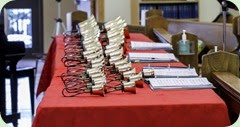 | Je ne suis pas très actif au blogue ces temps pour quelques raisons plaisantes. Voici la première. Conséquence du concert de Noël :Dans un article précédent, j’ai eu le plaisir d’annoncer mon retour sur la scène publique en tant que “chambriste”, jouant des sonates de Telemann et Bach avec le pianiste et directeur musical d’une église locale, David Chin. C’est grâce au concert de Noël (cliquez ici) où j’ai renctontré Stuart Belson, directeur des petits ensembles de Sonneurs de Cloches Anglaisses et ensuite David, qui dirige aussi le Choeur de Cloches.Ces contacts ont ouvert la possibilité de jouer ensemble (hautbois avec piano et/ou cloches). Ceci est motivant au point où j’ai enfin connecté correctement mon piano digital à l’ordinateur pour entammer des arrangements pour ces ensembles! Sonneurs de Cloches (Anglaises)Nous utilisons le mot “Anglais” en raison des caractéristiques de ces cloches particulières et que l’origine de la tradition est grandement britannique. |
| I went to a few rehearsals of the Trinity Handbell Chorus (12-15 players!) and one rehearsal of the quartet. These things and the people who play them are amazing! There are about 30 different ways to ring those bells. In the choir, each ringer is responsible for a few notes each, then count and hope you hit it right! This is really different than playing an oboe or a piano, you play 2 notes in really weird parts of the melodic lines. They made me play a little bit…. I can tell you this is NOT easy as the bells either don’t always do what you want them to! For example, here I had to play E and F, not Eb, not F# (on other pages) and the left hand is not always the off-beat!!! …. now try adding melodic phrasing with notes we don’t play!!! Amazing Teamwork:The point is, you can learn all the theory you like, when it’s time to play the oboe with handbells, or even more write for them, you can only really understand how amazing the players are when you’ve done it yourself! | Trinity Handbell Quartet 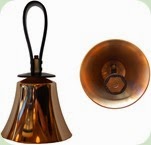 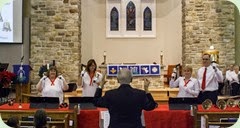 | J’ai participé à quelques répétitions du Choeur de Cloches Trinity (12 à 15 sonneurs!) et une répétition du quatuor. Les cloches et les musiciens sont simplement épatants! Il y a environ 30 manières de sonner ces cloches. Chaque musicien est responsable de quelques notes et doit compter comme un fou pour sonner à l’endroit exact! C’est vraiment différent que de jouer une mélodie au hautbois ou au piano: on joue nos 2 notes à des places vraiment pas évidents dans la ligne mélodique. Ils m’ont fait jouer un peu…. je peux vous assurer que c’est vraiment mêlant, en plus que la cloche semble vouloir sonner quand elle veut et non pas quand moi je le veux! Par exemple, je jouais le fa et le mi, pas le mi-b ni le fa-# (sur d’autres pages) et la main droite ne fait pas toujours le temps fort! … maintenant, il faut y ajouter le phrasé avec notes qu’on ne joue pas! Vrai jeu d’équipe:En fin de compte, quand vient le temps de jouer le hautbois avec les cloches, ou pire encore faire des orchestrations, toute la théorie qu’on peut lire n’aide en rien: il faut en faire l’expérience pour comprendre! |
| What is really amazing is that we know how practicing the oboe 30-45 minutes a day is not enough to really advance…. playing orchestral parts once a week certainly does not make one a virtuoso…. but with handbells that are stored in a church (only 3 people have the key) it is not possible at all for anyone to practice at any other time than the once-a-week rehearsals… and yet you can hear the results! I hope I get to make videos of the amazing bell-passing techniques and confusion they surmount to end-up playing with near professional artistry! | 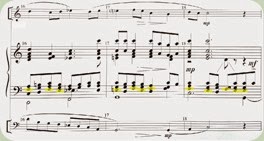 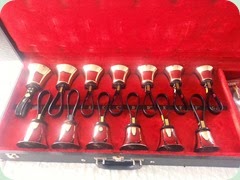 | Ce qui est vraiment impressionnant est que, nous savons combien travailler 30 minutes par jour ne fait pas un virtuose et que la répétition d’orchestre hebdomadaire ne suffit vraiment pas à la tâche, mais avec des cloches sous clef au sous-sol d’église, il n’est même pas possible de répéter sur son temps libre. Pourtant, vous pouvez voir les résultats avec ces amateurs! J’espère, plus tard, faire des vidéos de techniques de passage de cloche et la confusion qu’ils doivent surmonter pour enfin jouer avec un sens artistique vraiment développé! |
Sunday, April 26
Ring the (oboe) bells / Sonnez les cloches!
Subscribe to:
Posts (Atom)
